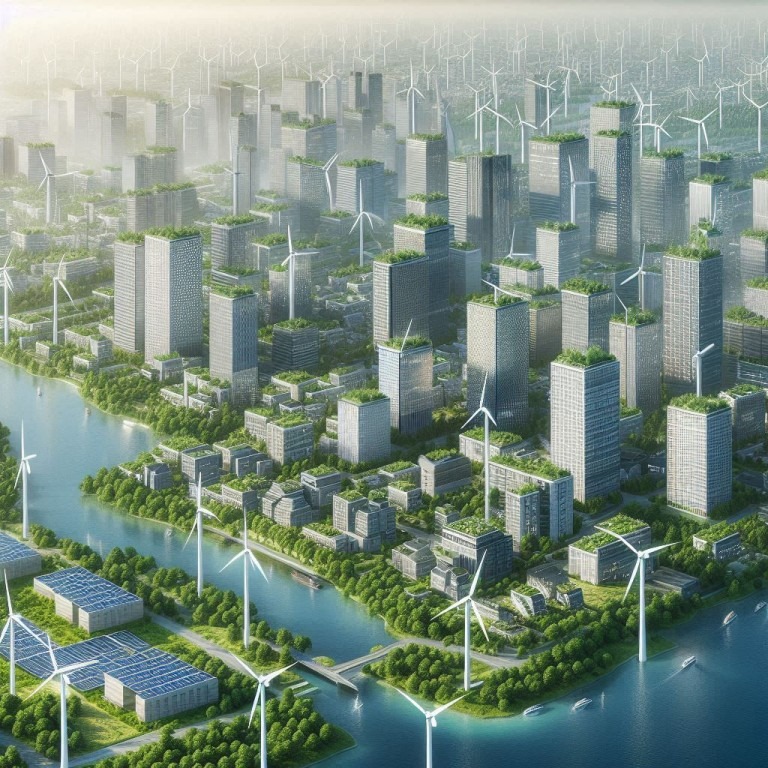Assia Werner
The Role of Renewable Energy in Germany’s Energy Transition (Energiewende)
The Role of Renewable Energy in Germany’s Energy Transition (Energiewende)
Germany is leading the charge toward a sustainable future with its ambitious plan to achieve carbon neutrality by 2045. At the core of this transformation is renewable energy, the driving force behind the nation’s Energiewende (energy transition). This initiative aims to phase out fossil fuels and nuclear power, replacing them with sustainable sources like wind, solar, and biomass. The goals are clear: combat climate change, secure energy independence, and foster long-term economic growth.
Already, renewable energy in Germany accounts for over 40% of electricity production, with wind and solar dominating the mix. This progress has significantly cut greenhouse gas emissions and sparked innovation in energy storage and smart grid technologies. However, challenges such as grid stability, public acceptance, and balancing supply with demand remain. Tackling these issues will be essential for Germany to fully realize its energy ambitions and solidify its status as a global leader in renewable energy innovation.

Key Renewable Energy Sources in Germany
Germany stands as a global leader in renewable energy, with wind and solar power forming the foundation of its energy transition. Wind energy is the largest contributor, with onshore wind farms spread across the northern plains and offshore installations growing steadily in the North and Baltic Seas. Solar energy complements this by thriving in southern regions, where photovoltaic systems make efficient use of available sunlight, despite Germany’s moderate climate.
In addition to wind and solar, biomass and hydropower play essential roles in the energy mix. Biomass, sourced from agricultural and forestry byproducts, provides steady, low-carbon energy, while hydropower offers a reliable, renewable option. Together, these sources showcase the diversity of renewable energy in Germany, helping the nation achieve its ambitious climate goals. This strategic mix not only enhances energy security but also solidifies Germany’s reputation as a pioneer in clean energy innovation.
Wind Power: A Cornerstone of Renewable Energy in Germany
Wind power plays a pivotal role in renewable energy in Germany, accounting for a substantial share of the country’s electricity. Onshore wind farms are concentrated in the northern regions, where steady winds and open landscapes provide ideal conditions for energy generation. Offshore wind farms in the North and Baltic Seas are rapidly growing, delivering higher efficiency and substantial energy output. Together, these installations form the backbone of Germany’s energy transition, powering homes and industries with clean, sustainable electricity.
The benefits of wind energy are undeniable. It operates without greenhouse gas emissions, reduces dependence on fossil fuels, and creates local jobs. Offshore wind farms, in particular, offer a unique advantage by harnessing stronger and more consistent winds without occupying valuable land. However, onshore wind projects often face challenges such as limited land availability and community concerns over visual and environmental impacts.
Grid capacity presents another significant hurdle. As wind energy production increases, Germany’s power grid must be upgraded to manage fluctuations and efficiently transport electricity from rural generation sites to urban centers. Despite these challenges, Germany remains steadfast in its commitment to wind power, driving innovation and setting global standards for sustainable energy solutions.
Solar Energy: Powering Germany’s Renewable Future
Solar energy is a vital pillar of renewable energy in Germany, making a substantial contribution to the nation’s electricity supply. Photovoltaic (PV) systems have experienced rapid growth, particularly in southern regions where they harness available sunlight efficiently. Germany’s early adoption of solar technology, supported by initiatives like feed-in tariffs, has established the country as a global leader in solar energy development.
Technological advancements have significantly enhanced the performance and affordability of PV systems. Innovations in solar cell materials and energy storage solutions have improved reliability, even under Germany’s moderate weather conditions. These developments have solidified solar energy’s role in reducing greenhouse gas emissions and supporting a stable, sustainable energy grid.
Beyond environmental benefits, solar energy has also driven economic growth, creating jobs in manufacturing, installation, and maintenance. Challenges remain, such as grid integration and balancing energy production with demand. However, Germany’s continued investment in solar technology reflects its commitment to overcoming these hurdles and securing its position as a trailblazer in the global transition to renewable energy.
Biomass: A Steady Source of Renewable Energy in Germany
Biomass is a key contributor to renewable energy in Germany, offering a stable and consistent energy source. Derived from organic materials such as agricultural residues, forestry byproducts, and biodegradable waste, it plays a vital role in the country’s energy mix. Biomass is particularly valued for its ability to generate both heat and electricity, especially in rural areas where these resources are readily available.
The versatility of biomass sets it apart from other energy sources. It can be converted into biogas, biofuels, or direct heat, making it adaptable to various energy needs. Recent advancements in biomass technologies, such as more efficient combustion systems and anaerobic digestion processes, have improved energy output while minimizing emissions. These innovations make biomass a crucial component of Germany’s efforts to reduce fossil fuel dependency and meet ambitious climate targets.
However, challenges persist. Ensuring the sustainable sourcing of raw materials and balancing biomass production with agricultural land use remain key concerns. Additionally, integrating biomass into Germany’s evolving energy grid requires careful planning. Despite these obstacles, biomass continues to be an indispensable part of Germany’s renewable energy strategy, providing a reliable path toward a low-carbon future.
Hydropower: A Sustainable Component of Renewable Energy in Germany
Hydropower has been a foundational element of renewable energy in Germany, providing a clean and dependable energy source. By harnessing the natural flow of rivers and reservoirs, hydropower plants generate electricity with minimal carbon emissions. Although its contribution to the energy mix is smaller compared to wind and solar, hydropower remains essential for ensuring grid stability and delivering a consistent energy supply.
The efficiency of hydropower is one of its greatest strengths. Modern plants can convert up to 90% of available energy into electricity, outperforming most other renewable technologies. Pumped-storage hydropower facilities are particularly valuable, storing surplus energy during off-peak times and releasing it during high-demand periods. This ability to balance energy supply and demand makes hydropower a critical component of Germany’s energy infrastructure.
However, hydropower’s expansion is limited by geographical and environmental factors. The availability of suitable sites and the need to protect aquatic ecosystems present significant challenges. Despite these constraints, Germany is committed to optimizing its existing hydropower plants and integrating them into its broader renewable energy strategy. Hydropower remains a reliable and sustainable solution, supporting the nation’s transition to a cleaner, greener energy future.

Economic and Environmental Impact of Renewable Energy in Germany
The transition to renewable energy in Germany has delivered profound economic and environmental benefits, redefining the country’s energy landscape. Economically, the renewable energy sector has become a major driver of job creation, spanning roles in manufacturing, installation, and maintenance of wind turbines, solar panels, and other clean energy technologies. This growth has also fostered innovation, attracted substantial investments, and solidified Germany’s position as a global leader in green technology.
On the environmental front, renewable energy has significantly reduced greenhouse gas emissions, contributing to cleaner air and combating climate change. By replacing fossil fuels with sustainable sources like wind, solar, biomass, and hydropower, Germany has not only lowered its carbon footprint but also safeguarded its natural resources. These achievements underscore how renewable energy supports Germany’s ambitious climate targets while paving the way for a sustainable and resilient energy future.
Job Creation through Renewable Energy in Germany
The growth of renewable energy in Germany has become a significant driver of job creation, fueling economic development and technological innovation. Thousands of jobs have been created across various sectors, including the manufacturing, installation, and maintenance of wind turbines, solar panels, and biomass facilities. These opportunities are distributed nationwide, revitalizing local economies and fostering balanced regional development.
Beyond direct employment, the renewable energy industry has stimulated a wide range of indirect jobs. Supply chain roles, research and development, and energy consultancy services have expanded, highlighting the industry’s broader economic impact. Germany’s commitment to clean energy has also bolstered its position as a global leader in sustainable technology, enabling the country to export its expertise and innovations to international markets.
Sustaining and expanding these job opportunities requires ongoing investment in the renewable energy sector. Supportive policies, workforce training programs, and incentives for technological advancement are essential to maintaining this momentum. By aligning its climate objectives with economic strategies, renewable energy in Germany not only addresses environmental concerns but also ensures a robust and sustainable job market for generations to come.
Investments in Renewable Energy in Germany
Germany’s dedication to renewable energy has established it as a global leader in sustainable investments. Over the past two decades, significant funding has been allocated to advancing clean energy technologies, including wind, solar, and biomass. These investments have not only accelerated the nation’s transition to a greener energy mix but have also stimulated economic growth and technological innovation within the renewable energy sector.
Both private and public investments have been pivotal in transforming Germany’s energy infrastructure. High-profile projects, such as offshore wind farms and state-of-the-art solar parks, have attracted international attention, solidifying Germany’s position as a hub for green technology. Moreover, substantial funding for research and development has driven breakthroughs in areas like high-efficiency solar panels and advanced energy storage systems, making renewable energy more affordable and scalable.
The long-term impact of these investments reaches far beyond energy production. By reducing dependency on fossil fuels, Germany has strengthened its energy security, stabilized energy costs, and ensured a reliable supply for businesses and households. As the global demand for clean energy solutions continues to grow, renewable energy in Germany remains a critical area for innovation and investment, combining environmental progress with robust financial opportunities.
Technological Innovations Driving Renewable Energy in Germany
Technological innovation is a cornerstone of renewable energy in Germany, driving the nation’s shift toward a sustainable energy future. Advances in wind turbine design, solar panel efficiency, and energy storage systems have significantly improved performance and reliability. Modern wind turbines with larger rotors and enhanced aerodynamics generate more electricity even in low-wind areas, while next-generation photovoltaic (PV) technology has made solar panels more efficient and affordable, enabling widespread adoption.
Energy storage has also made significant strides, addressing the challenge of intermittent renewable energy supply. Germany’s investment in battery storage systems and pumped-storage hydropower ensures grid stability and a consistent energy supply. Smart grid technologies further enhance efficiency by optimizing energy distribution and seamlessly integrating renewable sources into the existing infrastructure, creating a more resilient and flexible energy network.
These innovations are not only advancing Germany’s climate goals but also establishing the country as a global leader in green technology. By prioritizing research and development, Germany fosters an environment where cutting-edge solutions flourish, attracting international collaboration and investment. As global demand for sustainable energy solutions continues to grow, renewable energy in Germany remains at the forefront of technological excellence and innovation.
Renewable Energy in Germany: Reducing CO₂ Emissions and Improving Air Quality
The adoption of renewable energy in Germany has been instrumental in reducing CO₂ emissions and tackling climate change. By shifting from fossil fuels to clean energy sources such as wind, solar, and biomass, Germany has significantly decreased its carbon footprint. These efforts support the nation’s goal of achieving carbon neutrality by 2045, showcasing how renewable energy is a key driver in combating global warming.
Renewable energy has also brought notable improvements in air quality. Fossil fuel-based energy production releases pollutants that harm both human health and the environment. Transitioning to renewables has significantly reduced emissions of sulfur dioxide, particulate matter, and other harmful substances. This shift not only contributes to cleaner air but also enhances the quality of life for communities across Germany.
Beyond environmental benefits, the move to renewable energy has positive economic and societal impacts. Cleaner air reduces healthcare costs and boosts productivity, while improving public health. As Germany continues to invest in clean energy technologies and expand its renewable energy infrastructure, the dual benefits of reducing emissions and improving air quality will further solidify renewable energy in Germany as a cornerstone of sustainable progress.

Challenges and Opportunities for the Future of Renewable Energy in Germany
While renewable energy in Germany has made significant progress, the road ahead is not without challenges. A major obstacle is ensuring grid stability while accommodating the variable output of wind and solar power. Modernizing the energy infrastructure with advanced storage solutions, such as battery systems and pumped-storage hydropower, is essential to maintaining a consistent and reliable energy supply. Additionally, gaining public acceptance for renewable energy projects, particularly wind farms, requires addressing concerns about land use and environmental impact through transparent communication and thoughtful planning.
Despite these challenges, the future of renewable energy in Germany holds immense potential. Ongoing investments in research and development are driving innovations in energy efficiency, storage technologies, and grid integration. These advancements not only reinforce Germany’s commitment to its climate goals but also create opportunities for economic growth and job creation. By overcoming current barriers and building on its strengths as a leader in green technology, Germany is poised to shape a sustainable, secure, and resilient energy future.
Grid Stability and the Need for Energy Storage Solutions in Germany
The rapid expansion of renewable energy in Germany has highlighted the critical challenge of ensuring grid stability. Renewable sources like wind and solar are inherently dependent on weather conditions and time of day, leading to fluctuations in energy production. These variations can create imbalances in the grid, making it essential to develop solutions that maintain a stable and reliable energy supply.
Energy storage systems are at the heart of addressing this challenge. Technologies such as large-scale batteries and pumped-storage hydropower enable the storage of excess energy during periods of high production, which can then be released during peak demand. These solutions not only stabilize the grid but also enhance the efficiency of renewable energy utilization by reducing energy waste. Advances in battery technology, including higher capacity and faster charging capabilities, are driving progress in this area.
Germany is investing heavily in modernizing its energy infrastructure to support renewable integration. Smart grid technologies, combined with advanced storage systems, are being developed to balance supply and demand effectively. These efforts ensure that renewable energy in Germany can continue to grow sustainably, supporting the country’s ambitious climate goals while maintaining a secure and resilient energy network.
Public Acceptance of Wind and Solar Energy in Germany
The growth of renewable energy in Germany depends significantly on public acceptance, especially for wind and solar installations. While these technologies are vital for meeting the country’s climate targets, they sometimes face resistance from local communities. Common concerns include the visual impact of wind turbines, noise pollution, and land use conflicts, which can delay or complicate project implementation.
Solar energy generally enjoys broader acceptance, particularly rooftop installations that integrate seamlessly into urban and rural settings. However, large-scale solar farms can face opposition when they compete with agricultural land or disrupt natural habitats. Engaging communities early in the planning process and maintaining transparent communication are essential strategies for addressing these concerns and building local support.
Germany is making considerable efforts to enhance public acceptance through initiatives like education campaigns, transparent dialogue, and community-owned energy projects. These programs allow residents to participate financially and take an active role in the clean energy transition. By fostering trust and collaboration, these measures ensure that renewable energy in Germany continues to expand sustainably, balancing environmental benefits with community interests.
Potential for International Collaboration and Innovation in Renewable Energy in Germany
The development of renewable energy in Germany has created significant opportunities for international collaboration and innovation. As a global leader in clean energy, Germany works closely with other countries to share expertise, develop advanced technologies, and accelerate the shift to sustainable energy systems. These partnerships are essential for tackling global climate challenges while fostering economic growth and technological progress.
Joint efforts in areas such as wind energy, solar technology, and energy storage showcase the benefits of international cooperation. By combining resources and knowledge, Germany and its partners address common challenges, including grid stability and the integration of variable renewable energy sources. Cross-border initiatives, such as the European Green Deal and transnational energy infrastructure projects, demonstrate how collaboration enhances efficiency and ensures the seamless exchange of clean energy across regions.
Innovation is central to these collaborations, driving advancements in smart grids, energy storage, and sustainable manufacturing practices. Germany’s strong focus on research and development, supported by global partnerships, positions the country as a hub for cutting-edge renewable energy solutions. By prioritizing international cooperation and technological progress, renewable energy in Germany continues to lead the way in creating a sustainable and interconnected energy future.

How to Succeed in Germany’s Renewable Energy Market
The renewable energy in Germany market offers significant opportunities, but success requires a thorough understanding of its regulatory framework and ambitious energy transition goals. As Germany strives for carbon neutrality by 2045, the market for clean energy technologies is expanding rapidly. To succeed, businesses must align with the nation’s climate policies and sustainability objectives, ensuring their solutions meet both regulatory standards and market demands.
Innovation and collaboration are key to thriving in this competitive sector. Investing in advanced technologies, such as energy storage systems and smart grid solutions, is essential to addressing the challenges of renewable energy integration. Building partnerships with local stakeholders, including government agencies and community groups, can further enhance project acceptance and simplify integration into Germany’s energy infrastructure. By leveraging these strategies, businesses can not only contribute to but also benefit from one of the world’s most advanced renewable energy markets.
Understand the Regulatory Landscape for Renewable Energy in Germany
Navigating the regulatory framework is essential for success in renewable energy in Germany. The country’s commitment to achieving carbon neutrality by 2045 has shaped a robust set of policies, including the Renewable Energy Sources Act (EEG). This law governs feed-in tariffs, grid access, and market integration for renewable energy projects. Understanding these regulations is crucial to aligning business strategies with national climate goals and ensuring compliance with legal requirements.
At the European level, directives like the European Green Deal and the Clean Energy Package further influence Germany’s energy policies. These frameworks promote decarbonization, energy efficiency, and the expansion of renewables across the EU. Businesses entering the German market must adapt to these guidelines, particularly in areas such as emissions trading, energy storage, and cross-border electricity trading. Staying informed about updates and participating in industry consultations can offer valuable insights into upcoming changes.
Regional and local regulations also play a vital role in project implementation. Zoning laws, environmental impact assessments, and grid connection rules vary across states and municipalities. Engaging with local authorities early in the planning process can help address these specific requirements and build support for renewable energy projects. By understanding the regulatory landscape, businesses can effectively position themselves within Germany’s dynamic energy market.
Prioritize Innovation in Renewable Energy in Germany
Innovation is at the heart of the success of renewable energy in Germany, making it a critical priority for businesses looking to thrive in this dynamic sector. Advances in wind turbine design, solar panel efficiency, and energy storage technologies have revolutionized renewable energy systems, enhancing reliability and output. Companies that embrace these advancements not only strengthen their competitive edge but also actively support Germany’s ambitious climate goals.
Smart grid technology is a particularly transformative area, enabling the seamless integration of renewable energy sources into the power grid. Digital innovations, such as artificial intelligence (AI) and the Internet of Things (IoT), optimize energy production, distribution, and consumption, ensuring stability even with variable sources like wind and solar. Additionally, breakthroughs in battery storage and hydrogen technology are providing long-term solutions for balancing supply and demand, addressing one of the key challenges in the sector.
Collaboration is essential for fostering innovation. Germany’s robust ecosystem of research institutions, startups, and established technology providers offers businesses opportunities to co-develop groundbreaking solutions. By prioritizing innovation and forming strategic partnerships, companies can not only excel in the competitive market but also play a pivotal role in shaping a sustainable energy future powered by renewable energy in Germany.
Build Local Partnerships in Renewable Energy in Germany
Establishing strong local partnerships is essential for success in the renewable energy in Germany market. Collaborating with regional stakeholders, such as government agencies, community organizations, and energy companies, facilitates smoother project implementation and ensures compliance with local regulations. These partnerships provide valuable insights into zoning laws, grid connection requirements, and environmental assessments, streamlining the development process.
Community involvement is a cornerstone of renewable energy projects in Germany. Partnering with local residents through community-owned energy initiatives fosters trust and shared benefits. These collaborations not only build public support but also allow communities to actively participate in the energy transition, creating financial opportunities and promoting sustainable development. Open communication and early engagement are key to addressing concerns and gaining approval, especially for wind and solar projects.
Partnering with research institutions and local technology providers is another critical aspect of success. Germany’s innovation-driven ecosystem offers access to cutting-edge solutions and expertise in clean energy. By forging alliances with local stakeholders, businesses can tackle regional challenges effectively, enhance project acceptance, and play a vital role in advancing renewable energy in Germany.
Secure Financial Support for Renewable Energy in Germany
Securing financial support is a vital step for businesses aiming to succeed in the renewable energy in Germany market. The country offers a range of funding options, including government grants, subsidies, and low-interest loans, designed to encourage investment in clean energy projects. Programs such as the Renewable Energy Sources Act (EEG) provide financial incentives like feed-in tariffs, which reduce costs and promote the adoption of wind, solar, and other renewable technologies. Leveraging these resources is key to ensuring financial feasibility and long-term success.
Private investment is another significant driver of Germany’s renewable energy sector. The nation’s commitment to sustainability and ambitious climate goals attracts domestic and international investors seeking profitable opportunities in clean energy. To secure funding, businesses must present clear and compelling proposals that demonstrate long-term profitability, environmental benefits, and alignment with Germany’s carbon neutrality targets. Partnerships with financial institutions and green investment funds can further enhance access to necessary capital.
Collaborating with public and private stakeholders also plays a crucial role in securing financial support. Joint ventures with local companies, participation in community energy projects, and research partnerships can help businesses share costs and mitigate risks. By strategically tapping into available funding opportunities and building strong partnerships, companies can establish a solid foundation for thriving in the growing market for renewable energy in Germany.
Address Market-Specific Challenges in Renewable Energy in Germany
Operating successfully in the renewable energy market in Germany requires addressing its unique challenges with a strategic and adaptive approach. One of the primary obstacles is the integration of renewable energy sources like wind and solar into the existing power grid. The intermittent nature of these sources necessitates advanced energy storage solutions and a modernized grid to ensure stability and reliability. Companies should focus on innovative technologies such as battery storage, smart grids, and hydrogen systems to effectively tackle these challenges.
Public acceptance of renewable energy projects remains another significant hurdle. Concerns about the visual impact of wind turbines, land use conflicts, and environmental effects can delay or even halt projects. Engaging with local communities early in the planning process is crucial. Transparent communication, active stakeholder involvement, and benefit-sharing programs help build trust and foster public support, paving the way for smoother project execution.
Additionally, regional variations in resource availability and regulatory frameworks demand tailored strategies. For instance, northern Germany offers strong potential for wind energy, while southern regions are better suited for solar installations. Businesses must adapt their approaches to align with local conditions, policies, and infrastructure. By addressing these challenges proactively, companies can secure a strong position in Germany’s renewable energy market.

The Importance of Clear Communication in the Energy Sector
Clear communication is vital in the energy sector, particularly for companies operating in the intricate field of renewable energy in Germany. The industry spans technical processes, regulatory frameworks, and public engagement, all requiring precise and culturally nuanced communication. Accurate Renewable Energy Translations ensure that technical details are clearly conveyed, legal requirements are met, and messages resonate with diverse stakeholders, fostering understanding and collaboration.
High-quality renewable energy translation is essential for maintaining compliance with industry regulations and building trust among stakeholders. From translating wind turbine specifications and solar panel manuals to localizing environmental impact reports, professional language services minimize misunderstandings and prevent costly errors. These services ensure that all parties—engineers, policymakers, and communities—are aligned, enabling projects to progress smoothly and efficiently.
In a globalized market, effective communication also facilitates collaboration and innovation. International partnerships rely on specialized translation services to share research, market solutions, and present proposals with clarity and professionalism. By prioritizing accurate, industry-specific translations, businesses can enhance their global presence, strengthen relationships, and contribute to the ongoing advancement of renewable energy technologies.

Conclusion
The future of renewable energy in Germany is filled with promise, fueled by innovation, collaboration, and a steadfast commitment to sustainability. While challenges such as grid stability, regulatory hurdles, and public acceptance persist, the opportunities for growth and impact far outweigh these obstacles. By addressing these complexities with strategic planning and innovative solutions, businesses can become key drivers of a cleaner, more sustainable energy future.
Germany’s leadership in renewable energy serves as a global model for how innovation and effective communication can facilitate transformative change. From groundbreaking technologies to international partnerships, the country demonstrates that economic growth and environmental responsibility can go hand in hand.
For businesses looking to enter this thriving market, success depends on leveraging expertise, fostering collaboration, and ensuring clear, precise communication at every stage. With its dynamic ecosystem and forward-thinking approach, renewable energy in Germany offers companies the opportunity to contribute to a successful energy transition while establishing themselves as leaders in a rapidly evolving global industry.
The Most Popular Posts
Ready to Excel in Germany’s Renewable Energy Market?
Contact me today for precise, professional, and tailored translation services!

E-Mail:
assia.werner@online-redaktion-werner.de
Telefon:
+49 (0) 159 06055210

